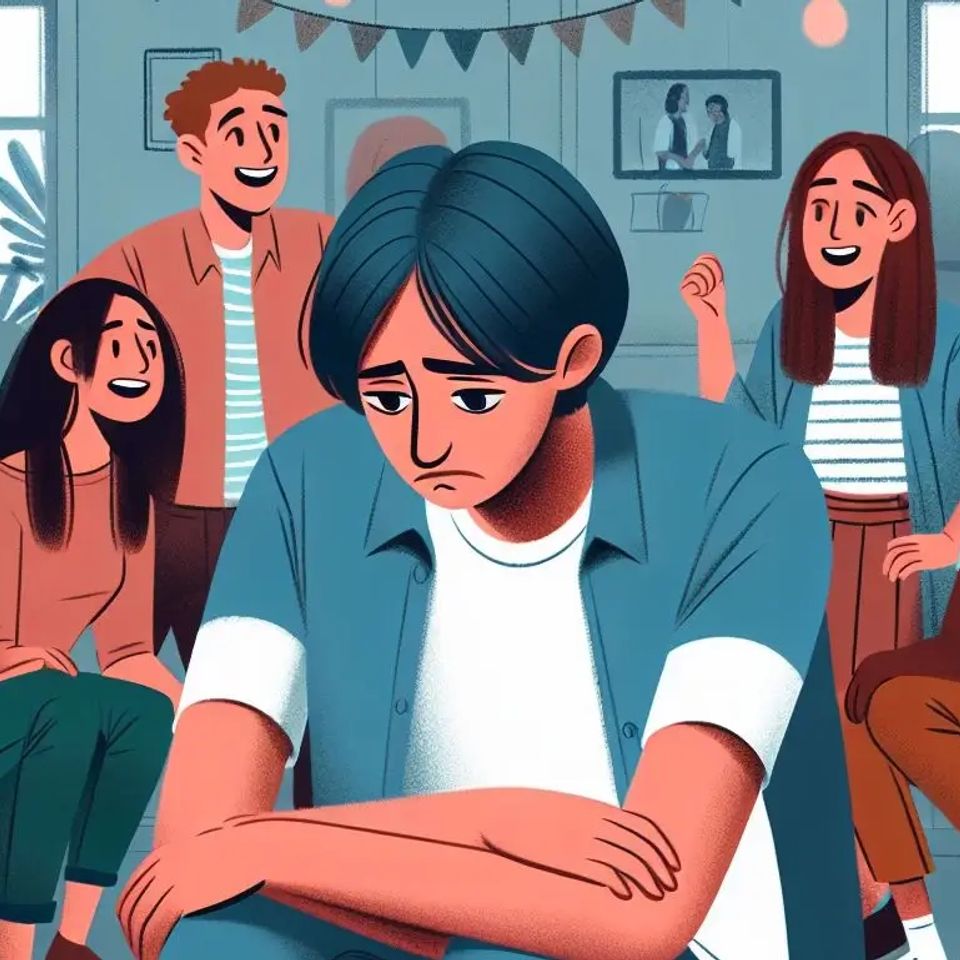
Life's great, why am I depressed? Exploring the hidden experiences of depression.
Have you ever looked around and wondered why you feel down when everything seems fine? Many people find themselves battling feelings of sadness and emptiness even when their lives appear to be great. This contradiction highlights the complexity of mental health issues and has often contributed to shame and guilt about having those feelings. Understanding why someone might feel depressed despite positive circumstances is crucial to fostering empathy and support.
The Guise of Happiness
From the outside, it might seem like those struggling with depression are living the dream. They may have rewarding careers, loving families, and financial security. However, this external success often masks their internal struggles.
For instance, consider someone who works at a prestigious firm, has a great partner, and enjoys a comfortable home. Many people with depression manage to keep their struggles hidden, often leading to confusion among friends and family. Despite having a life many would envy, they battle feelings of worthlessness and sadness, which can create guilt and shame about their emotional state.
Internal Battles
The disconnect between a seemingly happy life and inner turmoil often stems from unspoken internal battles. Many individuals face challenges such as low self-esteem, anxiety, or unresolved trauma. For example, those with a history of childhood trauma may carry emotional scars that persist, even when their circumstances improve.
This invisible struggle fosters isolation, as individuals may feel unable to share their feelings — fearing they won’t be understood or may appear ungrateful. This constant negative self-talk can drive them deeper into a cycle of sadness. Research shows that cognitive distortions, where individuals see their experiences through a lens of negativity, can exacerbate these feelings.
Expectations vs. Reality
Societal pressures can significantly affect emotional health. Many people hold onto beliefs about what it means to live a successful and happy life. This pressure can create a gap between their internal feelings and societal expectations.
For example, a person might feel pressured to express gratitude or happiness during life milestones like graduation or marriage. However, when they fail to experience these feelings, it can amplify their sense of inadequacy. Many individuals who appear to be "at the top of their game" experience feelings of impostor syndrome at some point, fearing that they are "not enough," adding to their emotional burden.
The Role of Neurobiology
Understanding depression requires recognizing its biological components. The brain's chemistry plays a crucial role in regulating mood. Imbalances in neurotransmitters like serotonin and dopamine can lead to feelings of sadness that do not directly relate to external situations.
Consider that nearly one in ten adults in the U.S. experience depression, often tied to these biological imbalances. Even with positive changes in one's life, these internal factors can hinder emotional adjustments, leaving individuals feeling stuck in their sadness. Such conditions can render them hopeless, questioning why they don’t feel joy despite their achievements.
Loneliness and Depression Amidst Connections
Surprisingly, even when surrounded by friends and family, many people with depression can feel profoundly alone. This feeling often arises from the pressure to maintain a cheerful persona, leading to the fear of burdening others with their problems.
Moreover, people may feel that their loved ones cannot comprehend their struggles. Many individuals with mental health issues report feeling isolated. This paradox of being surrounded by people yet feeling disconnected can deepen their depressive state, making it even harder for them to reach out for support.
The Impact of Unresolved Issues
Unresolved personal issues can be a significant factor in persistent feelings of depression. Past traumas or emotional pain that are not addressed can linger, affecting one’s emotional energy and overall happiness.
For example, someone who experienced a significant loss or betrayal might find that these feelings resurface during seemingly normal moments. Failure to process these emotions can cause individuals to feel stuck, leading to emotional instability and increased sadness.
Seeking Help Is Vital
Acknowledging feelings of depression is an essential first step toward healing. Seeking help is not a weakness; it’s a brave move toward restoring emotional wellbeing.
Engaging with mental health resources, such as therapy or support groups, can equip individuals with tools to better navigate their emotions. Understanding that they are not alone in their struggles can empower individuals to take decisive steps in their healing journey.
Final Thoughts
Depression doesn’t always align with external circumstances. Many people find themselves feeling low, regardless of their achievements, due to a combination of internal battles, societal expectations, neurobiological factors, and unresolved emotional pain. Acknowledging these hidden aspects can help dispel guilt and shame and encourage those affected to seek support.
If you or someone you know is experiencing depression, anxiety, or some other feeling and you don't understand why, remember that recognizing mental health struggles is an opportunity, not a failure. It is the first step toward healing and rediscovering balance in life. If you're ready to take the first step toward healing, reach out
The Guise of Happiness
From the outside, it might seem like those struggling with depression are living the dream. They may have rewarding careers, loving families, and financial security. However, this external success often masks their internal struggles.
For instance, consider someone who works at a prestigious firm, has a great partner, and enjoys a comfortable home. Many people with depression manage to keep their struggles hidden, often leading to confusion among friends and family. Despite having a life many would envy, they battle feelings of worthlessness and sadness, which can create guilt and shame about their emotional state.
Internal Battles
The disconnect between a seemingly happy life and inner turmoil often stems from unspoken internal battles. Many individuals face challenges such as low self-esteem, anxiety, or unresolved trauma. For example, those with a history of childhood trauma may carry emotional scars that persist, even when their circumstances improve.
This invisible struggle fosters isolation, as individuals may feel unable to share their feelings — fearing they won’t be understood or may appear ungrateful. This constant negative self-talk can drive them deeper into a cycle of sadness. Research shows that cognitive distortions, where individuals see their experiences through a lens of negativity, can exacerbate these feelings.
Expectations vs. Reality
Societal pressures can significantly affect emotional health. Many people hold onto beliefs about what it means to live a successful and happy life. This pressure can create a gap between their internal feelings and societal expectations.
For example, a person might feel pressured to express gratitude or happiness during life milestones like graduation or marriage. However, when they fail to experience these feelings, it can amplify their sense of inadequacy. Many individuals who appear to be "at the top of their game" experience feelings of impostor syndrome at some point, fearing that they are "not enough," adding to their emotional burden.
The Role of Neurobiology
Understanding depression requires recognizing its biological components. The brain's chemistry plays a crucial role in regulating mood. Imbalances in neurotransmitters like serotonin and dopamine can lead to feelings of sadness that do not directly relate to external situations.
Consider that nearly one in ten adults in the U.S. experience depression, often tied to these biological imbalances. Even with positive changes in one's life, these internal factors can hinder emotional adjustments, leaving individuals feeling stuck in their sadness. Such conditions can render them hopeless, questioning why they don’t feel joy despite their achievements.
Loneliness and Depression Amidst Connections
Surprisingly, even when surrounded by friends and family, many people with depression can feel profoundly alone. This feeling often arises from the pressure to maintain a cheerful persona, leading to the fear of burdening others with their problems.
Moreover, people may feel that their loved ones cannot comprehend their struggles. Many individuals with mental health issues report feeling isolated. This paradox of being surrounded by people yet feeling disconnected can deepen their depressive state, making it even harder for them to reach out for support.
The Impact of Unresolved Issues
Unresolved personal issues can be a significant factor in persistent feelings of depression. Past traumas or emotional pain that are not addressed can linger, affecting one’s emotional energy and overall happiness.
For example, someone who experienced a significant loss or betrayal might find that these feelings resurface during seemingly normal moments. Failure to process these emotions can cause individuals to feel stuck, leading to emotional instability and increased sadness.
Seeking Help Is Vital
Acknowledging feelings of depression is an essential first step toward healing. Seeking help is not a weakness; it’s a brave move toward restoring emotional wellbeing.
Engaging with mental health resources, such as therapy or support groups, can equip individuals with tools to better navigate their emotions. Understanding that they are not alone in their struggles can empower individuals to take decisive steps in their healing journey.
Final Thoughts
Depression doesn’t always align with external circumstances. Many people find themselves feeling low, regardless of their achievements, due to a combination of internal battles, societal expectations, neurobiological factors, and unresolved emotional pain. Acknowledging these hidden aspects can help dispel guilt and shame and encourage those affected to seek support.
If you or someone you know is experiencing depression, anxiety, or some other feeling and you don't understand why, remember that recognizing mental health struggles is an opportunity, not a failure. It is the first step toward healing and rediscovering balance in life. If you're ready to take the first step toward healing, reach out
